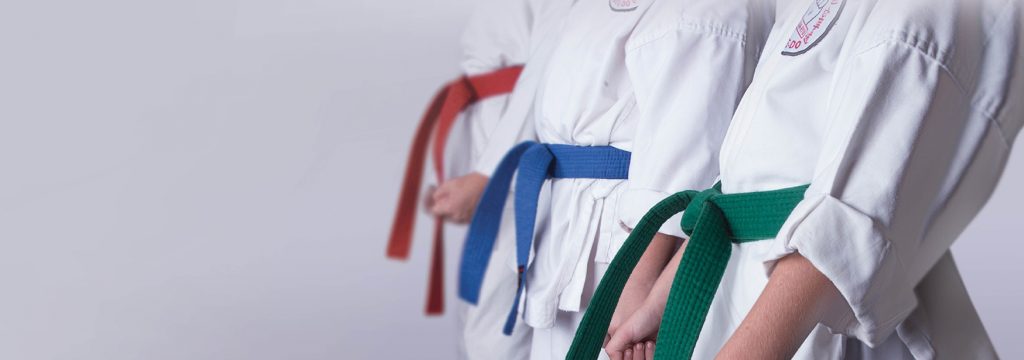Grading – “I’m not Worthy”

The moment a person puts on their first gi and stands in line, their journey to becoming a karate-ka begins. Along this road, they await many karate grading and belts—symbols of knowledge, experience, and achievement gained through hard work.
This road will often be smooth and straight as there will always be techniques and parts of training we pick up quickly, enjoy and feel comfortable with. Yet, we will find many bumps, bends, and potholes along the way. These appear in those techniques and exercises that challenge our coordination, patience, resolve and even our fears. This is how it is for every person who embarks on the journey, but the rough areas may differ for each person. One person may find a specific stance rugged to land incorrectly and sparring a challenge on their courage while another has no fear in sparring but has difficulty in their basic blocks and a different stance.
Despite where our challenges come from, they are an essential part of our development to becoming a karate-ka and can significantly positively affect our lives.
I believe most of you reading the above would agree. Indeed, many students have told me how their challenges in training have equipped them with a stronger resolve and a more positive attitude when facing other challenges. But that is not what this article is about.
Over the years, we have heard stories of how so many GKR students have found karate to help them in their life outside the dojo. This article is about allowing these newfound confidences, disciplines, and beliefs to filter back into the dojo. Confused?
So often, students have told me how their karate has helped them to have the confidence to tackle challenges outside the dojo. Others have said that karate makes them feel they can accomplish anything they set their minds to, which is terrific. But when I then tell them they are ready to grade, these same people look at me and say, “Grading?…me?…I’m not ready”. Perhaps you have been in the same situation yourself. Or perhaps you’re the person who never asks the question about your readiness for your grading until you know you are well and truly ready, and after spending a year or two on your blue belt, finally feel, “I’m ready, I’ll ask”.
Don’t feel at all that I am condescending to you. A person who feels unworthy to grade probably has high expectations of themselves, which is an excellent quality to carry around. But I often believe it is due to fear of failure or looking bad. The question of why karate makes us feel confident everywhere but in the dojo where we practice it is rather compelling. If this article strikes you with a nerve, let’s look deeper.
We spoke earlier about the smooth and rough roads in our journey to become karate-ka and how we all have times when we are on one of these two paths. The problem is that most people focus on their weaknesses and the things they struggle with. A person may drive for 20 minutes in smooth traffic and spend 10 minutes in gridlock. When they arrive home, however, they will often comment, “Boy, the traffic through the city is slow”. This is because the mind is said to work like a camera lens. When it focuses on one thing, it focuses on another.
An exercise you can try to see this working is to get another person and have them in a room or place that they are not too familiar with. Tell them you are going to give them a memory test, and you will give them 20 seconds to try to remember everything in the room that is red. You will notice they look everywhere, trying to jam everything in their mind that is red.
After 20 seconds, have them close their eyes and ask them to tell you everything in the room that is green! You will probably find if it is a room or place that they are not familiar with, they will laugh and realize they have drawn a blank. When they open their eyes, they will notice plenty of green things they have looked over while looking for red items. The challenge was that when they focused and locked their minds in on everything red, they automatically locked out on everything green, even right next to those red things.
The same happens in the dojo. We may have an overall strong kata, but when our instructor picks us up on two or three techniques that we need to work on, we start thinking that our Kata is lacking and forget that there were 20-30 techniques that the instructor didn’t need to correct. When we lock in on our few mistakes, we lockout on all the splendid techniques we possess. It has been said that too many people make monuments from their shortcomings and see their successes as moments. Instead, people should make monuments of their successes and see their shortcomings as moments.
Perhaps you’re reading this and thinking, “But my Kata is all bumps and potholes, and my instructor is still putting the fear of having to go and grade to me”. Well, yes, a technique can be worked on and improved upon, but there are many factors to consider when sending a student to grade. Techniques, attitude, effort, and etiquette are all very important. Perhaps your instructor will see more than you see if the above is a case similar to yours.
Another reason many people feel unworthy of grading is how they judge a good karate-ka. This stems from being influenced by those outside of karate. Should I elaborate?
Have you ever been asked by someone if you have ever had to use your karate? If I had a dollar for every time I have been asked: “Have you ever had to use your karate?” I would have $473. Truthfully I have no idea, but it would be a lot. My usual reply is “No”. I say this due to the fact that the question they are really asking is, have I ever been attacked, which thankfully I haven’t.
If I were to answer their question truthfully, I would say, “Yes, I use my karate every day. It shows up in the way I shake a person’s hand and respond to ‘How are you?’ with ‘Fantastic and improving.’
It shows up in my willingness to try new things and to focus on my task at hand”. But if I were to say this, they would only look at me puzzled and then ask, “So, have you ever been attacked?”
Society views a karate-ka by how they see us portrayed on TV, as shy hermits with no people skills but who valiantly appear in black trench coats to take out anyone who dares cross our path or the path of a friend. In reality, nothing could be further from the truth. Unfortunately, society’s view of a black belt is that of someone with unbelievable fighting skills, but little else can quickly become our view. From this, it can be easy to see that if we do not fit the mould of an excellent wrecking machine in Kumite, then “who are we to grade?”
Looking back, originally in Okinawa, fathers taught their sons karate primarily to develop their character and nobility. The self-defence aspect was secondary. After all, what was more valuable, being prepared to defend oneself against an assailant like a mugger who might approach you once in a lifetime or being prepared to defend oneself against multiple assailants like fear, doubt, worry and distraction who will approach you every day of your life?
Regarding grades, one thing to remember is that your instructor knows best. They have been watching your progress for months and would only wish to send you a grade if they were confident you were worthy. An instructor has an unbiased view of your training, and they are looking at you as a “whole” and not just tending to focus on your shortcomings. They are also probably not focusing on whether you’re ready to take on a gang of thugs in a trench coat. Understand that anytime your instructor says “I want to send you to grading” it is another way of saying that they are proud of you.
Achievement is defined in the dictionary as “Accomplishing something by special effort.” Each week, we put our whole effort into our karate training. As long as we continue doing this, we are guaranteed to succeed. Grading is not easy and will not be given to you, so the next time you feel unworthy when your instructor feels otherwise, try to focus on your strengths. There are probably more than you think.
Related Articles
Kids Tips For Karate Tournaments
Expert Tips For Perseverance



